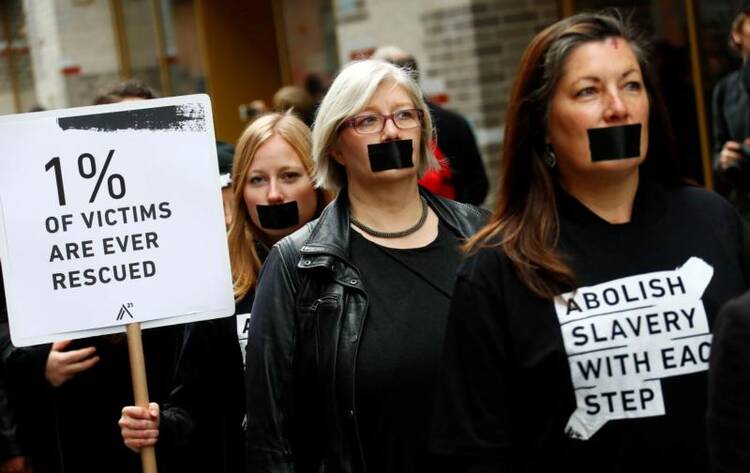WASHINGTON (CNS) -- A tragic, but consistent, finding in research on prostitution is the frequent correlation between childhood sexual assault and exploitation in the commercial sex trade.
Marian Hatcher, policy analyst and victim advocate in the Cook County Sherriff's Office in Illinois, shared data from the county's 2017 program for prostituted people seeking to exit "the life."
Of all those who received support, 94 percent had experienced violence in the sex trade. Sixty-nine percent also had suffered as child victims of sexual assault.
"Traffickers can sense (past sexual abuse)," said Angela Aufdemberge, president of Vista Maria, a social services organization in Dearborn Heights, Michigan. "The biggest need is to address maltreatment in homes and regulating who our kids are communicating with on the internet."
It is as though the harm of childhood assault causes some to degrade their own value, and to associate degradation with sexuality, long term.
The key to rebuilding a life degraded is learning to love oneself.
But that takes a long time, according to a former prostitute who was helped by Dawn's Place, a residential rehabilitation center near Philadelphia, which is operated by several Catholic religious orders.
"For me, being in that program, basically they were teaching me to love me first," she said at a Washington conference last May on fighting human trafficking and sexual exploitation. "It took a whole year of trauma therapy to feel like a new person."
According to the State Department's annual Trafficking in Persons Report, the United States is a source, transit, and destination country for men, women, and children -- both U.S. citizens and foreign nationals -- subjected to sex trafficking and forced labor, including domestic servitude.
Dawn's Place is one of several places where U.S. women religious dedicated to fighting trafficking offer care and services for survivors of trafficking. Sisters are also involved in other centers in the U.S., including are Lifeway Network in New York City, Sisters in Shelter in Tiffin, Ohio, and CAST/Los Angeles.
Dozens of orders of women religious, along with individual sisters and several foundations, are members of U.S. Catholic Sisters Against Human Trafficking, which itself is part of the Coalition of Catholic Organizations Against Human Trafficking.
The sisters' anti-trafficking organization's website is www.sistersagainsttrafficking.org. Information about the coalition can be found on the U.S. Conference of Catholic Bishops' website in a section on anti-trafficking efforts, https://bit.ly/1EfqP7d.
According to the State Department's annual Trafficking in Persons Report, "the United States is a source, transit, and destination country for men, women, and children -- both U.S. citizens and foreign nationals -- subjected to sex trafficking and forced labor, including domestic servitude.
"Trafficking can occur in both legal and illicit industries or markets, including in brothels, escort services, massage parlors, strip clubs, street prostitution, hotel services, hospitality, sales crews, agriculture, manufacturing, janitorial services, construction, health and elder care, and domestic service."
According to the U.N. Office on Drugs and Crime Global Report on Trafficking in Persons for 2018, traffickers mostly target women and girls, but the number of male victims is increasing.
Trafficking for sexual exploitation continued to be the most commonly detected form of trafficking, according to the report, which said that 66 percent of trafficking cases are considered sex trafficking. Women again make up 72 percent of reported sexually exploited victims.
In the Catholic Church, papal teaching prioritizes efforts to eradicate human trafficking. All of the last three popes -- St. John Paul II, Pope Benedict XVI and Pope Francis -- have publicly decried trafficking in people, calling for its eradication and for the protection of survivors.










